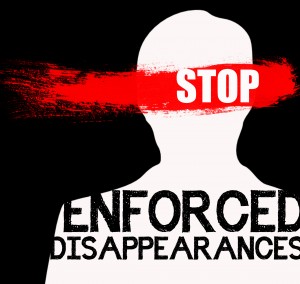Imagine if you woke up one day and were unable to find your loved one because they spoke out against the government, a prominent drug lord, or simply were at the wrong place at the wrong time. What if you knew that they were detained for years on end, but their whereabouts and fate were unknown? What would you do? Enforced disappearances are still an appalling reality in many countries around the world. For example, did you know that in Mexico more than 26,000 people have been reported missing or in disappearance between 2006 and 2012? That 25,000 people have been reported missing in Colombia? That thousands of suspected opponents of the Syrian government had been arbitrarily arrested and detained since February of 2011?
Enforced disappearance is a recent concept made famous by past and recent Latin American regimes. The United Nations General Assembly adopted the International Convention for the Protection of All Persons from Enforced Disappearances in December of 2006. It was only then that the crime of enforced disappearances was defined and expressly prohibited as “… the arrest, detention, abduction or any other form of deprivation of liberty committed by agents of the State or by persons or groups of persons acting, with the authorization, support or acquiescence of the State, followed by a refusal to acknowledge the deprivation of liberty of by concealment of the fate or whereabouts of the disappeared person, which place such a person outside the protection of the law.” Some experts consider this to be the strongest human rights treaties ever adopted by the United Nations. So, what is the big problem here? Why is it so hard to get states to ratify this Convention?
The international community seems to be silent on this particular legal issue. Why? Most likely because most countries are involved in committing such an atrocious crime. States must take full responsibility to solve all aspects of this issue. To get states to take full responsibility, victims must start speaking up and raising awareness. We must simultaneously raise awareness to stop enforced disappearances by bringing in the peace negotiators, developing political will, and involving the media. To stop the violence, we must break the silence.

I think, as astutely pointed out, one of the most difficult aspects in ratifying a convention like this is that a country, as a whole, must take full responsibility for itself. It is often difficult for an individual to do this, let alone an entire nation. Even if the convention is ratified, providing a legal definition of these disappearances will not be enough. It takes a complete and unitary change of approach and dedication to cause.
Additionally, while Latin American nations have obvious commonalities, what similarities do Mexico, Colombia and Syria have that created these devastating trends. Is it as “simple” as corrupt governments? Or is there an underlying connection to be discovered?
In cases like this, the fear that terrorists organizations and the like have imposed are much greater than the will to evoke and elicit change. Until this fear can be combatted properly and with assurance, it is not likely such change will occur.
I think this is a huge issue in the international community especially with so many innocent lives at stake and people losing their loved ones for acts as innocent as speaking out against the government. I agree that one of the reasons it is so difficult to gets states to ratify this convention is because they are involved in most of these violent acts against their own citizens. I also think that the media in those countries and victims might be hesitant to speak out at all in fear for their lives, the lives of their family members, or from fear of those in power in the state. I agree that this silence must be broken, but it makes me wonder how this silence can be broken in states that commit such atrocious crimes and where its citizens live in such fear to speak out against their own government.
I think that one way to break the silence is to impose harsher punishments on states that will not reveal the whereabouts of disappeared persons or if the state will not release these persons than to at least allow them to be given a fair trial under international standards. These families have the right to know what has happened to their loved ones so it is imperative that when enforced disappearances occur they receive as much media coverage as possible. In addition, states need to have better technological resources, tools, and programs to search for the disappeared.
Even if countries with reportedly high enforced disappearances statistics adopted the proposed convention, there is still a serious problem with enforceability. The issue, it seems to me, has more to do with unlawful government practice and culture surrounding the role of government. There is no denying that enforced disappearances are horrific, tragic, and warrant international attention. But is this convention the attention that this issue needs? The problem is not international standards. The problem is domestic standards imposed by unfair government practice. Now, one argument is that it is the unequivocal role of the international community to influence domestic practice. In fact, international law operates primarily by influence. But, perhaps the solution is not to influence governments, but rather, influence its people. If the citizens of each country were better informed, educated, and equipped with the resources to amend their government in a proactive, democratic fashion, we could potentially see a change in government practice that would undoubtedly lead to less unlawful actions.